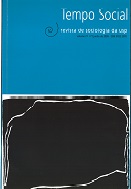The tension between social time and individual time
DOI:
https://doi.org/10.1590/S0103-20702009000100003Keywords:
André Gorz, Social theory, Time, Time of work, AgingAbstract
The article explores the theme of time in the work of André Gorz, using this motif as a basis for understanding his conception of the relationship between individual and society. This aim in mind, it identifies and describes his three approaches to time: the first seeks to construct an axiology of values based on the three temporal dimensions (past, present and future); the second examines the relationship between time and aging; and the third deals with the time of work. After describing each of these three approaches, the article concludes by identifying the tension between social time and individual time in the author's theory, a tension that largely arises from a philosophical viewpoint that conceives individual and society as almost antagonistic entities.Downloads
References
DURKHEIM, Émile. (1989), As formas elementares de vida religiosa. São Paulo, Edições Paulinas.
GORZ, André. (1958), Le Traïtre. Paris, Éditions du Seuil.
GORZ, André. (1961), “Le vieillissement”. Les Temps Modernes, 187: 638-665.
GORZ, André. (1962), “Le vieillissement II”. Les Temps Modernes, 188: 829-852.
GORZ, André. (1964), Stratégie ouvrière et néocapitalisme. Paris, Éditions du Seuil (trad. bras.: Estratégia operária e neocapitalismo. Rio de Janeiro, Zahar, 1968).
GORZ, André. (1967), Le socialisme difficile. Paris, Éditions du Seuil (trad. bras.: O socialismo difícil. Rio de Janeiro, Zahar, 1968).
GORZ, André. (1973), Critique du capitalisme quotidien. Paris, Éditions du Seuil.
GORZ, André. (1977a), Fondements pour une morale. Paris, Galilée.
GORZ, André. (1977b), Écologie et liberté. Paris, Galilée.
GORZ, André. (1980), Adieu au prolétariat. Paris, Galilée (trad. bras.: Adeus ao proletariado. Rio de Janeiro, Forense Universitária, 1982).
GORZ, André. (1983), Les chemins du paradis. Paris, Galilée.
GORZ, André. (1988), Métamorphoses du travail. Paris Galilée (trad. bras.: Metamorfoses do trabalho. São Paulo, Annablume, 2003).
GORZ, André. (1989), “A discussion with André Gorz on alienation, freedom, utopia and himself”. In: _____. The Traitor. Londres, Verso.
GORZ, André. (1994), “Revenu minimum et citoyenneté”. Futuribles, 188: 61-66.
GORZ, André. (1997), Misères du présent, richesse du possible. Paris, Galilée (trad. bras.: Misérias do presente, riqueza do possível. São Paulo, Annablume, 2004).
GORZ, André. (2003), L’immatériel. Paris, Galilée (trad. bras.: O imaterial. São Paulo, Annablume, 2005).
GORZ, André. (2004), Le Traïtre (suivi de “Le vieillissement”). Paris, Galilée.
GORZ, André. (2006), Lettre à D. Histoire d’un amour. Paris, Galilée (trad. bras.: Carta a D. História de um amor. São Paulo, Annablume/Cosac Naify, 2008).
HABERMAS, Jürgen. (1987), The Theory of Communicate Action. Boston, Beacon Press, vol. 2.
HABERMAS, Jürgen. (1990), Pensamento pós-metafísico. Rio de Janeiro, Tempo Brasileiro.
HONNETH, Axel. (2003), Luta por reconhecimento. São Paulo, Editora 34.
MEAD, George Herbert. (1934), Self, Mind, and Society. Chicago, University of Chicago Press.
SARTRE, Jean-Paul. (1956), Being and Nothingness. Nova York, Pocket Books.
SARTRE, Jean-Paul. (1983), Cahiers pour une morale. Paris, Gallimard.
SILVA, Josué Pereira da. (1996), Três discursos, uma sentença. São Paulo, Annablume/Fapesp.
SILVA, Josué Pereira da. (2002), André Gorz: trabalho e política. São Paulo, Annablume/Fapesp.
SILVA, Josué Pereira da. (2008), Trabalho, cidadania e reconhecimento. São Paulo, Annablume.
Downloads
Published
Issue
Section
License
Copyright (c) 2015 Tempo Social

This work is licensed under a Creative Commons Attribution-NonCommercial 4.0 International License.


